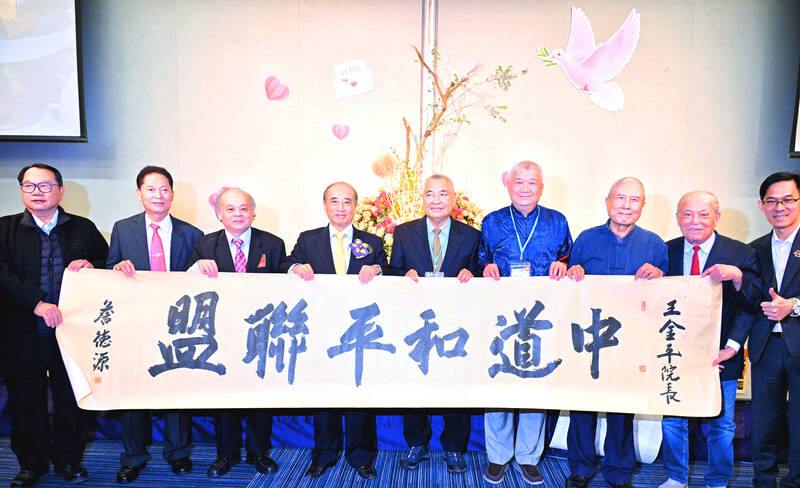Former Legislative speaker Wang Jin-pyng (王金平) of the Chinese Nationalist Party (KMT) unveiled a new cross-strait narrative yesterday, advocating for “separate governance without division” between Taiwan and China.
“The two sides of the Taiwan Strait are not subordinate to each other in terms of governance but share sovereignty without division (兩岸治權互不隸屬,主權同而不分),” Wang said at the launch of the “Middle Way Peace Alliance” (中道和平聯盟), a cross- strait think tank.
Wang explained that his proposal acknowledges the reality that the two sides across the Taiwan Strait are governed separately while keeping avenues open for fostering peaceful relations.

Photo: Fang Pin-chao, Taipei Times
Both sides should aim to ensure the safety and well-being of their people while respecting each other’s political systems and ways of life, he said, calling for a pragmatic approach that acknowledges both history and current realities.
It was not clear whether Wang’s formula was meant to replace the KMT’s existing stance or the so-called”1992 consensus.”
The “1992 consensus” refers to a tacit understanding between the KMT and the Chinese Communist Party that both sides of the Strait acknowledge there is “one China,” with each side having its own interpretation of what “China” means.
Taiwan’s ruling Democratic Progressive Party has never accepted the “1992 consensus.”
Wang said that cross-strait relations, which once seemed to hold the promise of peace, have encountered many uncertainties in recent years and are now considered by international experts as a potential flashpoint for military conflict.
He attributed this to not only rapid global changes and ideological constraints, but also misunderstandings caused by the stagnation of cross-strait exchanges, adding that his proposal could help facilitate dialogue.

Chinese Nationalist Party (KMT) Chairman Eric Chu (朱立倫), spokeswoman Yang Chih-yu (楊智伃) and Legislator Hsieh Lung-chieh (謝龍介) would be summoned by police for questioning for leading an illegal assembly on Thursday evening last week, Minister of the Interior Liu Shyh-fang (劉世芳) said today. The three KMT officials led an assembly outside the Taipei City Prosecutors’ Office, a restricted area where public assembly is not allowed, protesting the questioning of several KMT staff and searches of KMT headquarters and offices in a recall petition forgery case. Chu, Yang and Hsieh are all suspected of contravening the Assembly and Parade Act (集會遊行法) by holding

PRAISE: Japanese visitor Takashi Kubota said the Taiwanese temple architecture images showcased in the AI Art Gallery were the most impressive displays he saw Taiwan does not have an official pavilion at the World Expo in Osaka, Japan, because of its diplomatic predicament, but the government-backed Tech World pavilion is drawing interest with its unique recreations of works by Taiwanese artists. The pavilion features an artificial intelligence (AI)-based art gallery showcasing works of famous Taiwanese artists from the Japanese colonial period using innovative technologies. Among its main simulated displays are Eastern gouache paintings by Chen Chin (陳進), Lin Yu-shan (林玉山) and Kuo Hsueh-hu (郭雪湖), who were the three young Taiwanese painters selected for the East Asian Painting exhibition in 1927. Gouache is a water-based

Taiwan would welcome the return of Honduras as a diplomatic ally if its next president decides to make such a move, Minister of Foreign Affairs Lin Chia-lung (林佳龍) said yesterday. “Of course, we would welcome Honduras if they want to restore diplomatic ties with Taiwan after their elections,” Lin said at a meeting of the legislature’s Foreign Affairs and National Defense Committee, when asked to comment on statements made by two of the three Honduran presidential candidates during the presidential campaign in the Central American country. Taiwan is paying close attention to the region as a whole in the wake of a

OFF-TARGET: More than 30,000 participants were expected to take part in the Games next month, but only 6,550 foreign and 19,400 Taiwanese athletes have registered Taipei city councilors yesterday blasted the organizers of next month’s World Masters Games over sudden timetable and venue changes, which they said have caused thousands of participants to back out of the international sporting event, among other organizational issues. They also cited visa delays and political interference by China as reasons many foreign athletes are requesting refunds for the event, to be held from May 17 to 30. Jointly organized by the Taipei and New Taipei City governments, the games have been rocked by numerous controversies since preparations began in 2020. Taipei City Councilor Lin Yen-feng (林延鳳) said yesterday that new measures by